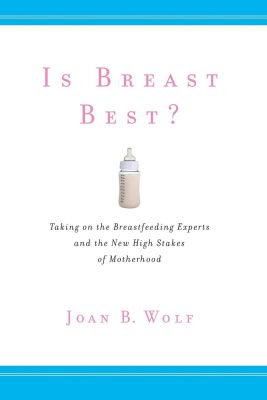Mothering, as author Joan Wolfe well knows, is one of the most polarizing topics of our time. And yet we all seem to agree that, when it comes to feeding babies, breast is best. At least, until now.
In her new book, “Is Breast Best? Taking on the Breastfeeding Experts and the New High Stakes of Motherhood,” Joan B. Wolfe, a professor at Texas A&M, argues that the science behind this universal “truth” is flimsy. “The message that women are getting about this borders on hysterical,” she says. Wolfe points out that women have been told “this is the most significant decision you will ever make for your child, that breastfeeding is the greatest gift you can ever give your child, and if you don’t breast feed, there are serious repercussions.” By taking a fresh look at the data on breast and bottle feeding, Wolfe concludes that all-or-nothing statements like “best food” and “greatest bonding experience” are far-fetched. In her view, most mothers are committed to doing – and afraid of not doing – everything in their power to help their kids; but, she says, “It probably doesn’t really matter very much which method you choose.”
In your book you argue with the scientific evidence that breastfeeding provides a host of health benefits for both the baby and the mother. Is the research wrong?
We give women lots of unequivocal information about the merits of breastfeeding, and women take it very seriously. When you tell somebody that if you breastfeed, your child will be more intelligent and sick less often, will have fewer heart attacks and will not get leukemia, that’s pretty serious advice. But the truth is that the science grounding that advice is much more problematic than we are led to believe. Lots of women are making a decision about how to feed their baby based on incorrect information.
Breastfeeding is promoted as something that protects against Leukemia, ear infections and obesity, and protects mothers against breast cancer and ovarian cancer. These are outrageous claims. Breastfeeding does reduce gastro-intestinal. But it’s one thing to say your baby might get one fewer diarrheal infection this year and it’s another thing to say your baby might get leukemia if you don’t breastfeed – and the Surgeon General has said this. (The Surgeon General’s Call to Action to Support Breastfeeding, January 20, 2011).
What have you seen in the data that leads you to believe these claims are false?Â
What about the emotional bond?
You’ve said you’re interested in how breastfeeding gets in the way of leveling the playing field between men and women and how it gets in the way simply because we assume that it’s best. But what’s the downside?
The truth is that in terms of the decision to breastfeed, it’s not all gains. There are costs to breastfeeding – the costs are a mother’s time, the mothers own emotional and physical health, the long term economic consequences that come from not working or choosing to have a more marginal job so that you can breastfeed. None of these costs get talked about. What we hear is that breastfeeding is free. And from a woman’s perspective, I think that this is offensive. If men had functioning mammary glands, my sense is that we’d get a very different discourse about breastfeeding. We would have a sense of how small the benefits probably are and we would say that formula feeding is fine.
Why would the medical establishment — and many parents themselves — overstate the case for breast feeding?
Why would the medical establishment — and many parents themselves — overstate the case for breast feeding?
We are a risk-obsessed society. We are consumed with the idea that we should be preventing any risks that we can identify, and we are particularly focused on health risks. We’re also a society that believes that mothers have a certain responsibility to do anything for their children. Mothers are responsible for eliminating any risk to their baby, no matter how small, unlikely or poorly understood; no matter what the cost is to the mother. We care about the children but we define what is best for the children often according to what mothers can do to alleviate risk. But on the other hand we’re willing to allow our children to be in risky situations, when to eliminate that risk would require sacrifice from fathers or communities or governments.
In the book, I talk about “total motherhood,” which is the idea that we expect mothers to essentially disappear – when it comes to taking care of their children – as individual autonomous beings. All of their needs, wants, and desires are subjugated to their baby or children.

